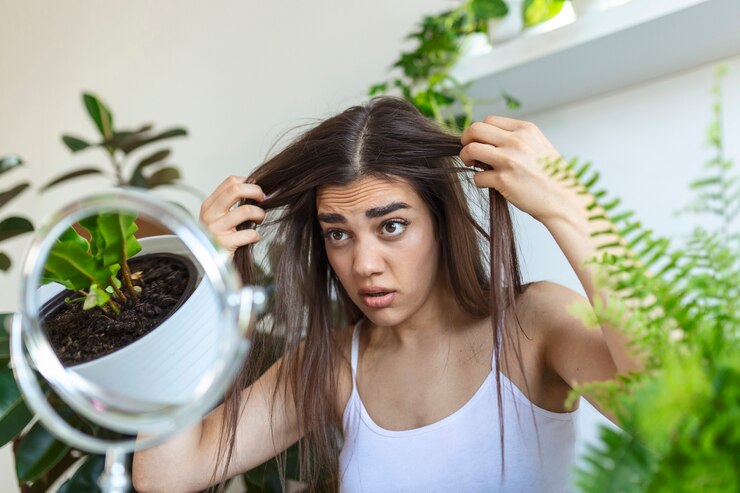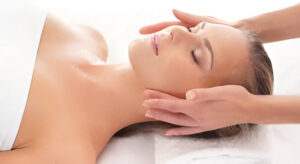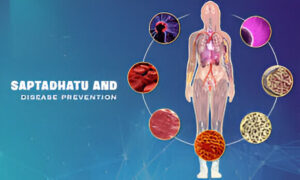Hair is often considered one of the most vital aspects of our appearance, and a healthy scalp is essential for beautiful, strong locks. Yet, many people face persistent hair and scalp problems, from dandruff and itchiness to hair fall and thinning. Fortunately, Ayurveda offers a holistic approach to addressing these concerns. By incorporating Ayurvedic principles into your diet and lifestyle, you can rejuvenate your hair naturally.
Understanding the Root Causes of Hair and Scalp Problems
Ayurveda identifies hair health as a reflection of overall well-being. Hair and scalp problems often arise due to imbalances in the doshas—Vata, Pitta, and Kapha—which regulate various bodily functions. Here are some common causes:
- Pitta Imbalance: Often triggered by excessive heat, stress, and unhealthy diets, leading to hair thinning and premature greying.
- Vata Imbalance: Associated with dryness and roughness, which can result in dandruff and brittle hair.
- Kapha Imbalance: Causes excess oil production, clogged pores, and fungal infections on the scalp.
Understanding these doshas is the first step toward finding a solution. By addressing these root causes through targeted Ayurvedic methods, you can experience long-lasting improvements in hair and scalp health.
Dietary Tips for Healthier Hair
Diet plays a significant role in combating hair and scalp problems. Consuming the right foods nourishes your hair from within, improving its strength, texture, and growth. Here’s what to include:
- Hydrating Foods: To combat dryness, include water-rich foods like cucumber, watermelon, and coconut water. These help keep your scalp hydrated and reduce the risk of flakiness.
- Protein-Rich Diet: Eggs, lentils, and nuts are excellent sources of protein, a key building block for strong hair. Protein deficiency is a common cause of hair thinning and weakness.
- Iron-rich foods: Dark leafy greens, beets, and jaggery help improve blood circulation to the scalp. Better circulation ensures that hair follicles receive adequate nutrients.
- Healthy Fats: Avocado, ghee, and flaxseeds provide the essential fatty acids that enhance shine and moisture. Omega-3 fatty acids in these foods are particularly beneficial for scalp health.
- Herbal Teas: Replace caffeinated drinks with herbal teas like hibiscus or nettle to reduce Pitta-related hair issues. These teas have cooling properties that soothe the scalp.
Additionally, avoid overly processed foods, sugary snacks, and spicy meals, as these can exacerbate Pitta and Kapha imbalances. A balanced diet is the foundation for healthy, resilient hair.
Ayurvedic Herbs and Oils for Hair Care
Ayurvedic remedies focus on using natural ingredients that are gentle yet effective in treating hair and scalp problems. Incorporate the following into your routine:
- Bhringraj: Known as the “King of Herbs” for hair, it promotes growth and prevents premature greying. Regular use of bhringraj oil can also strengthen hair roots.
- Amla (Indian Gooseberry): Rich in Vitamin C, it strengthens hair follicles and adds natural shine. Amla can be consumed as a juice, powder, or applied topically.
- Neem: Excellent for addressing dandruff and itchy scalp due to its antifungal properties. Neem oil or paste can be applied directly to the scalp.
- Fenugreek: Nourishes the scalp and improves hair texture. Fenugreek seeds soaked overnight can be ground into a paste for a DIY hair mask.
- Coconut and Sesame Oils: Ideal for regular scalp massages, these oils hydrate and protect your hair. Mixing these oils with a few drops of essential oils like lavender can enhance the experience.
To enhance the effectiveness of these remedies, warm the oils slightly before application, as this allows better absorption. Consistency in using these natural treatments is key to seeing results over time.
Lifestyle Changes to Prevent Hair and Scalp Problems
In addition to diet and natural treatments, lifestyle habits play a critical role in maintaining healthy hair. The Ayurvedic lifestyle approach emphasizes balance and routine. Follow these tips:
- Daily Scalp Massage: Gently massaging your scalp stimulates blood circulation and strengthens hair roots. Use circular motions to ensure the oils penetrate deeply.
- Stay Hydrated: Drink at least 8 glasses of water daily to keep your scalp hydrated. Dehydration can lead to dryness and itchiness.
- Stress Management: Practice yoga, meditation, or pranayama to calm the mind and reduce hair fall linked to stress. Stress is one of the leading contributors to hair loss.
- Proper Sleep: Ensure 7-8 hours of restful sleep to allow your body to repair and rejuvenate. Poor sleep quality can weaken hair follicles over time.
- Avoid Overwashing: Washing your hair too often strips it of natural oils, leading to dryness. Opt for mild shampoos and wash only 2-3 times a week.
- Protect from Pollution: Cover your hair when exposed to dust or harsh weather conditions. Pollution can clog pores and weaken hair strands.
By incorporating these practices into your daily routine, you can create an environment that promotes healthy hair growth.
Ayurvedic Practices for Long-Term Benefits
Adopting Ayurvedic practices is not just about treating existing conditions; it’s about nurturing your body for lasting health. For persistent hair and scalp problems, these therapies can provide relief:
- Shirodhara: A calming treatment where warm herbal oils are poured over the forehead, improving circulation and reducing stress. This therapy is particularly beneficial for stress-related hair fall.
- Nasya Therapy: Helps detoxify the head region and strengthens hair roots. It’s an effective treatment for chronic scalp issues.
- Herbal Hair Masks: Weekly treatments with ingredients like aloe vera, hibiscus, and yogurt can deeply condition your scalp. These masks provide both nourishment and hydration.
- Abhyanga (Full-Body Oil Massage): Regular oil massages improve overall blood circulation, indirectly benefiting hair health.
These practices not only address hair and scalp problems but also contribute to overall mental and physical well-being. Ayurveda views the body as an interconnected system, emphasizing harmony and balance.
Conclusion: A Holistic Approach to Hair Care
In conclusion, Ashtanga Ayurveda, the best Ayurvedic clinic in Dubai offers a comprehensive and natural way to address hair and scalp problems, ensuring healthier, shinier hair without the use of harsh chemicals. Incorporating Ayurvedic practices like diet adjustments, herbal treatments, and stress management into your routine can transform your hair and overall well-being. If you’re seeking the best Ayurvedic treatment in Dubai, look for centres specializing in holistic therapies tailored to your unique needs. Embrace an Ayurvedic lifestyle, and you’ll notice external and internal improvements in your health and vitality.









